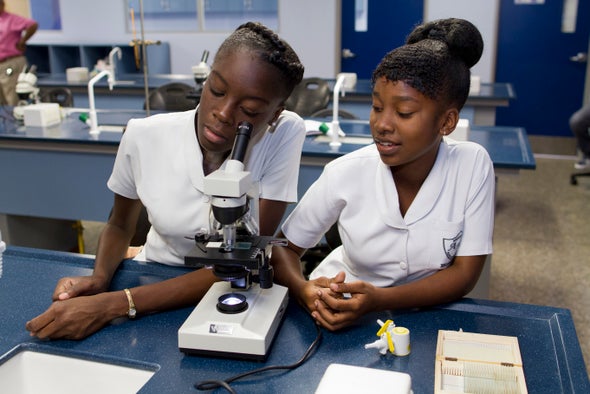(单词翻译:单击)
听力文本
This is Scientific American — 60-Second Science. I'm Steve Mirsky.
"I think we all agree that there is a crisis, even, in our society about how we use science. We all know about climate change denial on one side, but there's also all the issues about opposing GMO's or anti-vaccination."
Lucy Jones. She's a seismologist and a policy advisor on earthquake risk. She spoke February 17th at the annual meeting of the American Association for the Advancement of Science in Washington, D.C.
"And what we are seeing here is there is a significant part of society that doesn't understand how the scientific process works. And looks at scientific information as something you get told to believe because the scientists said it's true. And then if you're believe that authority figure, there are several others you could turn to as well."
So, what to do? In 2016 she founded the Dr. Lucy Jones Center for Science and Society, which tries to get the public and policy makers to use scientific information to improve the resiliency of their communities. And here's a brief portion of her talk proposing solutions to the problem of the gap between scientists and society.

"We need to look at science education for the broader public more focused on process rather than results. And this is another place where the internet has really changed things. When I was in school, if you want to learn those facts, you sort of had to get it from the teachers and learn enough to be able to go out and start doing research. Now if you want a result you can get it on your computer right away. What we need to do is not be teaching kids, for instance, that dinosaurs evolved into chickens, but rather how to recognize that the 'connection-between-dinosaurs-and-the avian-species' Web site is more reliable than one that tells us we descended from visitors from Mars. Both of them are out there on the internet."
You can listen to Lucy Jones's entire talk. Just look for the annual meeting live stream at meetings.aaas.org.
For Scientific American — 60-Second Science. I'm Steve Mirsky.
参考译文
这里是科学美国人——60秒科学。我是史蒂夫·米尔斯基。
“我想我们大家都同意,我们的社会存在着有关如何使用科学的危机。一方面,我们都知道‘否认气候变化',但也存在着反对转基因或反对疫苗接种的所有问题。”
露西·琼斯是地震学家和地震风险的政策顾问。2月17日,她在华盛顿特区举行的美国科学促进会年会上发表了讲话。
“我们看到的情况是,社会中有很多人不理解科学过程的运作方式。因为科学家说一些科学信息是真的,他们就完全相信被告知的信息。如果你相信那个权威人物,那你也可以求助其他几个人。”
那我们应该怎么做?2016年,她创立了露西·琼斯博士科学与社会中心,致力于让公众和决策者使用科学信息来改善社区弹性。她在讲话中提出了解决方案,旨在化解科学家和社会之间的鸿沟,以下是这部分演讲片段。
“我们需要聚焦更广泛的公众科学教育,让他们更关注过程而不是结果。这是互联网改变的另一个地方。我上学时,如果想了解这些事实,必须从老师那里学到足够的知识,然后才能出去做研究。而现在,如果你想获得研究结果,你可以立刻用电脑查到。举个例子,我们需要做的不是告诉孩子恐龙已经进化成鸡,而是教他们认识到,比起有人告诉他们‘我们是来自火星的访客',‘恐龙与鸟类联系'网站上的信息更可靠。上述两种说法网上都有。”
大家可以收听露西·琼斯的完整演讲。登陆meetings.aaas.org网站上便可查看年会直播回放。
谢谢大家收听科学美国人——60秒科学。我是史蒂夫·米尔斯基。
译文为可可英语翻译,未经授权请勿转载!
重点讲解
重点讲解:
1. turn to 求助于;求教于;
For assistance, they turned to one of the city's most innovative museums.
他们求助于该市最具创新风格的一家博物馆。
2. as well 除…之外;也;还;
Are they coming as well?
他们也来吗?
3. focus on 集中(注意力);关注;
Following a day of medical research, the conference focused on educational practices.
在就医学研究专题讨论一天后,会议接下来的主题集中在教学实践上。
4. rather than 而非;胜于;而不是;
She made students think for themselves, rather than telling them what to think.
她让学生们独立思考,而不是一味地告诉他们该思考些什么。


